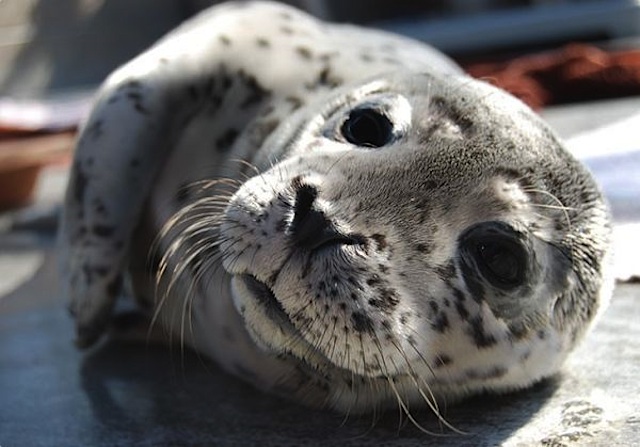If you’re looking for something new to see by the sea, we’ve got a place you can bring the kids to meet some of the cutest critters around, and learn something while you’re at it. The Marine Mammal Care Center in San Pedro is a hospital with a very different kind of patient: the inhabitants here are mostly baby seals who have lost their moms and cannot feed themselves, along with other sick or injured sea mammals. Your own pups will learn how these pinnipeds* are cared for and how helpers here prepare to return them to the wild.
photo: Marine Mammal Care Center via Facebook
(*Pinnipeds are all flipper footed marine mammals. See? You’ve learned something already!)
The non-profit Marine Mammal Care Center at Fort MacArthur looks small and unassuming at first glance. But keep in mind that this is a real hospital. Though the space is small, big things happen here. The whole family is welcome and it’s a wonderful place to take your time and thoroughly explore.
photo: Marine Mammal Care Center via Facebook
The beauty of this rescue establishment reveals itself as you observe the animal patients, such as 4 to 5-month-old pups, grooming themselves and frolicking with their cute flippers. Other mammals may have just arrived, suffering from malnutrition or infections. These are separated from the rest of the healthier gang lounging and playing in water basins.
photo: Marine Mammal Care Center via Facebook
Plaques explain such things as the always-confusing difference between seals and sea lions or what type of food the pups are fed. You’ll see that some need tube feeding, and they get a slurpie of glucose, electrolytes, vitamins and proteins, sometimes requiring a human volunteer to assist with the meal. But you really get the whole story from the docents. They will tell you and your own little beach babes that seal pups who lost their moms and would starve in the wild are brought here to be nurtured back to health and taught to live a life on their own in the ocean. Injured sea lions might arrive with a fishing line around their neck, unable to eat and having lost 50 pounds. At any given time, you might encounter 20 to 50 critters here, from California sea lions to Pacific harbor seals to fur seals, each with a different story to tell.
photo: Marine Mammal Care Center via Facebook
Before visiting, kids should be reminded that interaction with the patients is discouraged. The adorable pups also don’t get names. This is to improve their chances of seamlessly disappearing back into the ocean they came from. For this purpose, the pinnipeds are kept safe behind a wire mesh fence. This can be frustrating for little ones at first, as they are so darn cute they call out for a cuddle, but once you learn more about the animals’ plight, it all makes sense. It’s a great opportunity to learn not just about animal care, but about empathy, the power of volunteering and our ability to make a difference. The care center volunteers will tell you they especially love teaching kids, as they ask the most varied and interesting questions.
photo: Marine Mammal Care Center via Facebook
There’s a small gift shop selling cuddly plush toys (these are the things made for patting, touching and cuddling!), T-shirts and postcards. The center is open to visitors every day of the year during daylight hours. Admission is free but donations are encouraged. Staff to answer questions is usually around between 10 a.m. and 4 p.m.
photo: Sylvie Greil
Marine Mammal Care Center
3601 S. Gaffey St.
San Pedro
310-548-5677
Online: marinemammalcare.org
Now that you’re in San Pedro and have visited the seal pups, what to do next?
- Cabrillo Beach: this is an excellent spot for exploring tide pools.
- Cabrillo Marine Aquarium: smaller than the Long Beach behemoth, this is a perfect first aquarium for kids.
- Point Fermin Lighthouse: this is a real, early Victorian lighthouse built in 1874.
- Lunch at The Whale & Ale: stop by the coziest eatery in San Pedro, serving British pub grub.
- White Point Beach and Nature Preserve: take one of many family-friendly trails with awesome views of the Peninsula.
What are your favorite spots for ocean creature encounters? We’d love to hear about them!
—Sylvie Greil











